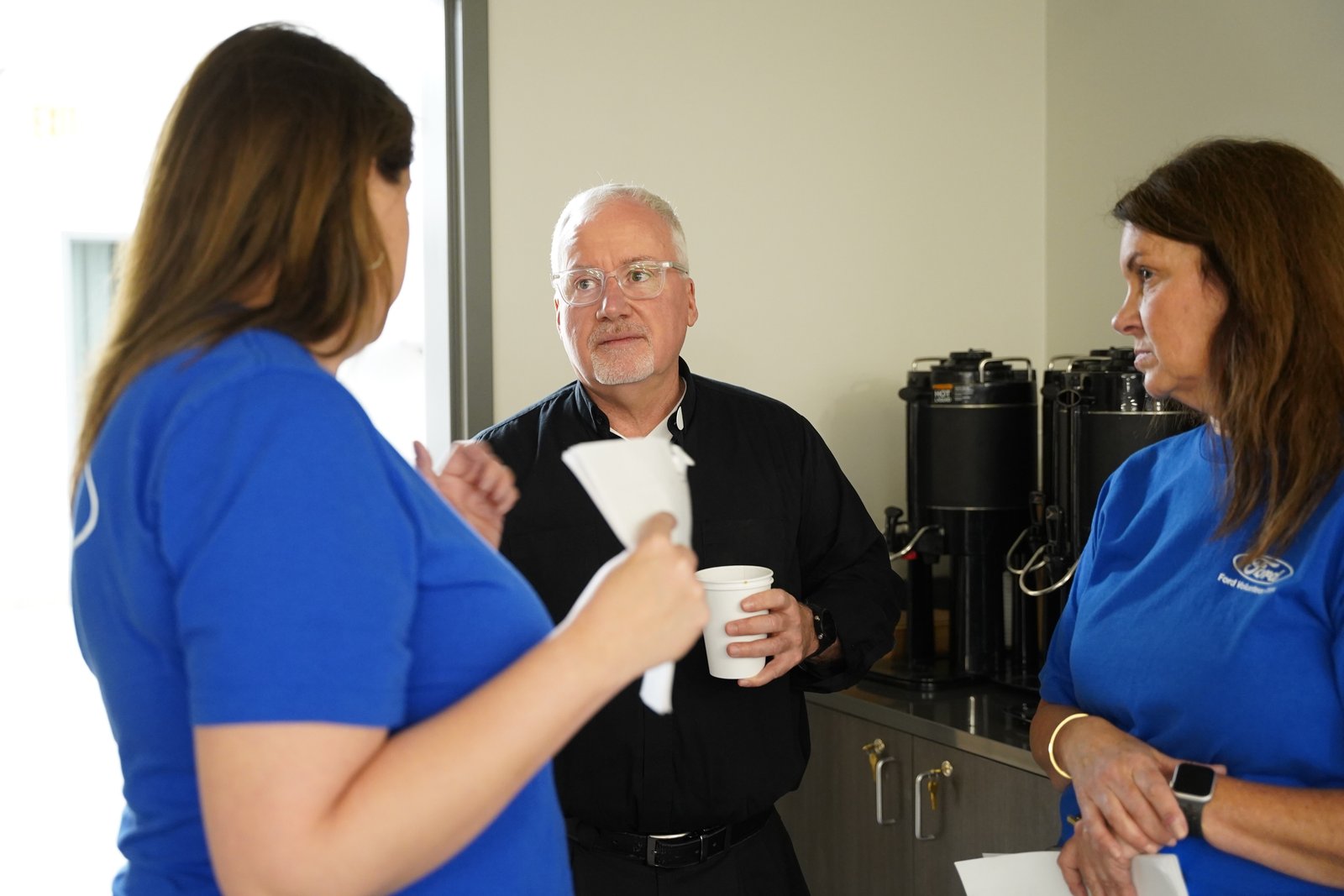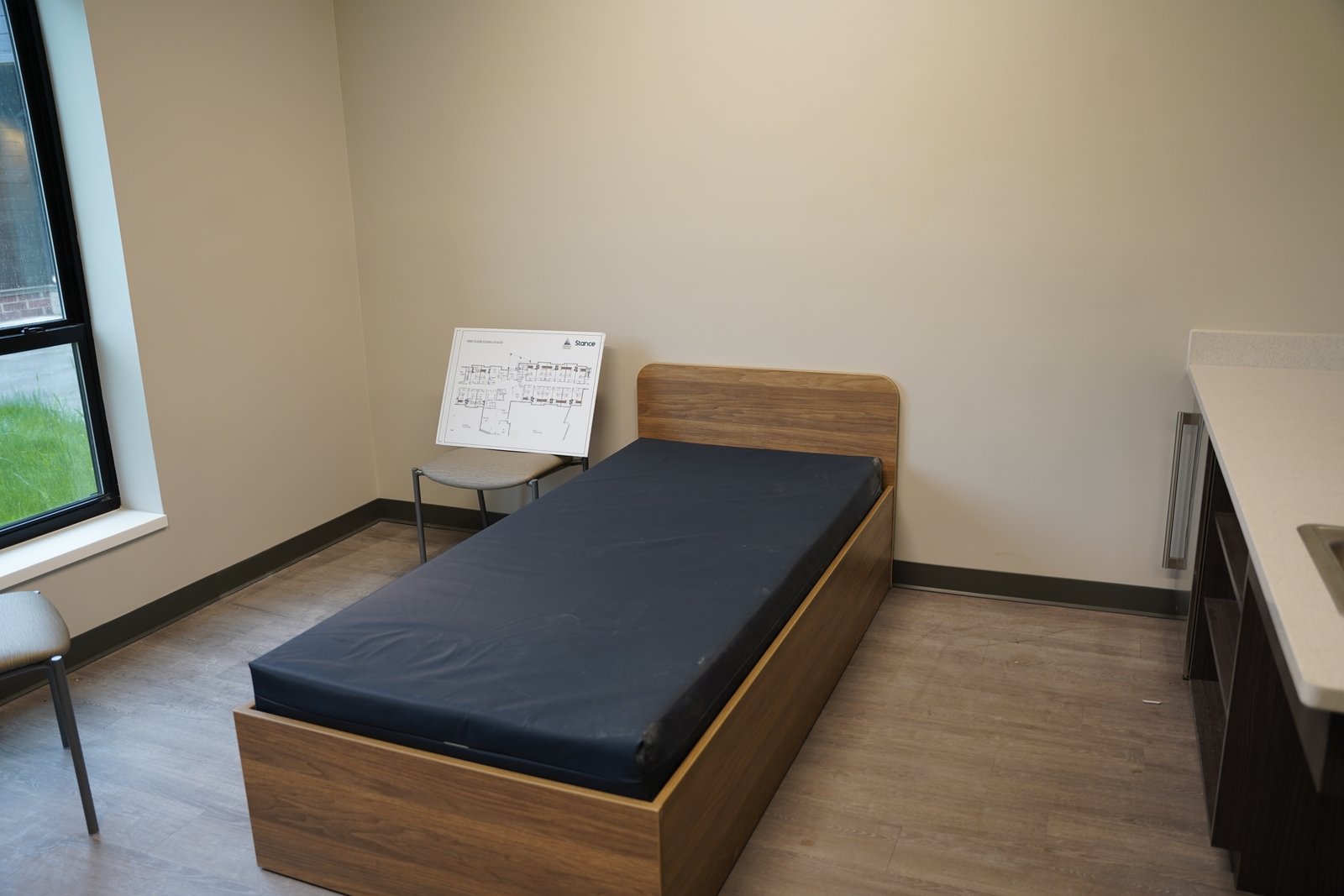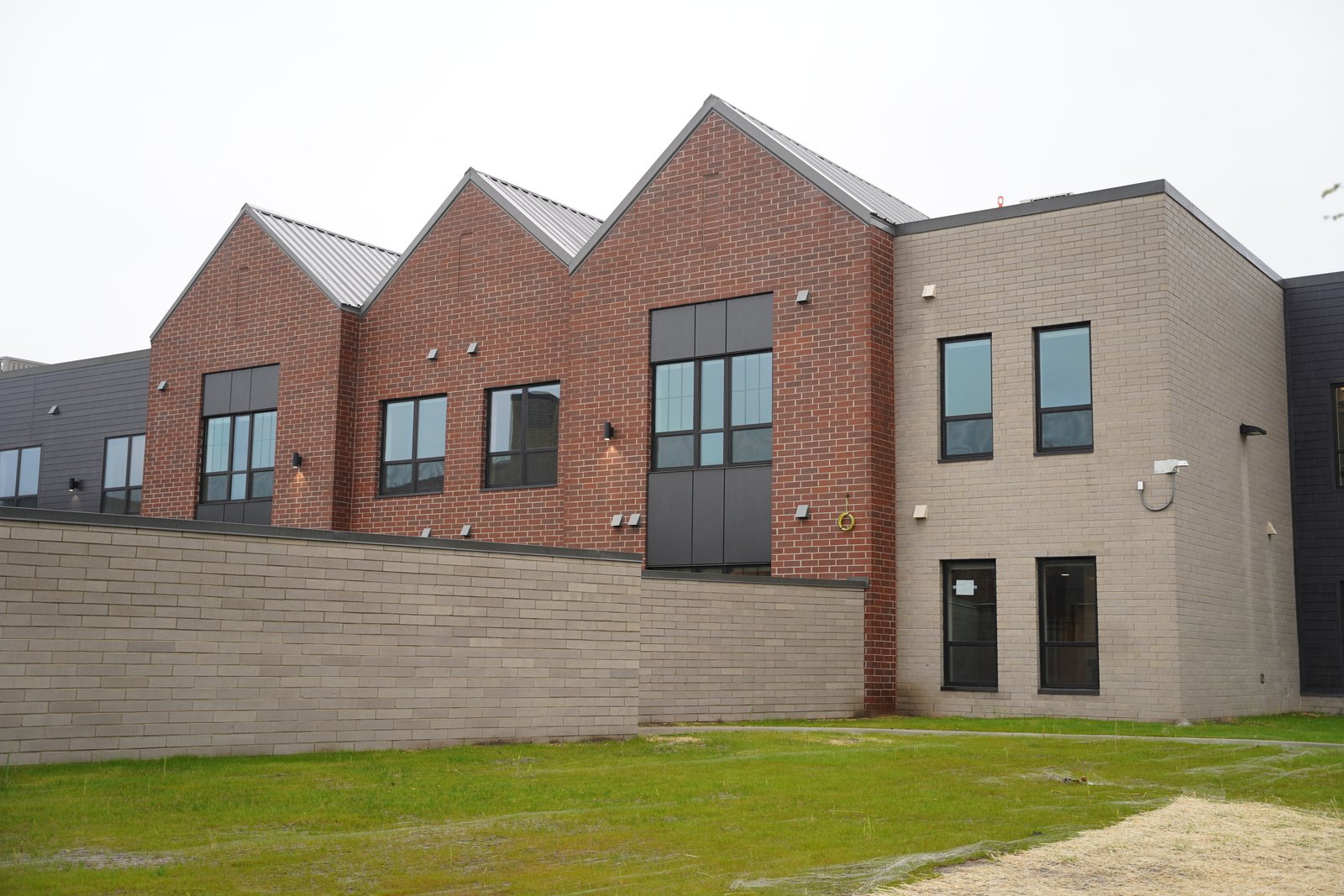Bridge housing facility on Detroit's west side, ready to open June 3, will address the trauma caused by chronic homelessness
Editor's note: Throughout the month of May, we asking readers to prayerfully consider a gift to the Catholic Services Appeal, which directly supports Detroit Catholic's mission to provide thought-provoking, inspiring local Catholic journalism. We are grateful for your prayers and generosity.
DETROIT — The Pope Francis Center’s bridge housing facility on Detroit’s west side is an ambitious project for an audacious mission.
Fr. Tim McCabe, SJ, president and CEO of the Pope Francis Center, said the homeless ministry that operates out of SS. Peter and Paul (Jesuit) Church in downtown Detroit is nearing completion of a one-of-a-kind transitional facility to get people off the streets and into permanent housing.
The $30 million, 40-unit facility located just off Interstate 96 is set to open June 3. According to Fr. McCabe, the bridge housing facility not only will be a game-changer for how people think of homeless ministry in Detroit, but can serve as an example for the entire country.
“It’s a heavy lift, but I believe that we’re going to put Detroit on the map for a place that actually cares for the homeless and helps them successfully navigate back to permanent housing,” Fr. McCabe told Detroit Catholic. “I believe we’re going to change the national conversation around what it means to care for people who are experiencing homelessness.”

The bridge housing facility will feature furnished apartments for people who were chronically homeless — living on the streets for more than a year — including a bed, shower and sink, recreation areas, access to support services, job skills training, and substance abuse treatment.
Even small touches — like access to a mailbox so guests can fill out job applications and have a sense of place — are all designed to address the physical and psychological challenges the chronically homeless face on their path to permanent housing.
RELATED: About those shoes: Parishioner gifts Pope Francis Center CEO unique pair of kicks
Guests can stay anywhere from 90 to 120 days, enough time to work through paperwork and other social services to find a more permanent solution, while getting acclimated to apartment living and addressing the underlying issues that led to them living on the streets.
“There’s nothing exactly like what we’re about to do here,” Fr. McCabe said. “I’ve visited 25 different programs in 11 different cities, looking at best practices of treating chronic homelessness, and we’re putting it all into one building. We looked at programs like Haven for Hope in San Antonio, which gave me the idea of putting everything into one space, from detox to permanent supportive housing assistance and government offices, getting everything we need to make people successful in one spot.”

The bridge housing facility will feature gathering spaces where guests can host family and friends, a gymnasium that can be used by the neighboring community, and an industrial-grade kitchen where guests can learn how to wash dishes and prepare food, skills that could help them get a job in a restaurant.
Chronically homeless people can be uncomfortable with multi-storied buildings, Fr. McCabe said, so most of the apartments are on the first floor. The hallways are wide and painted in soothing tones to make the facility more like a home and less like an institution.
“One unique feature in our design is we will have an outdoor area for the small population of homeless that are dealing with such severe trauma that they cannot come indoors,” Fr. McCabe said. “We have an outdoor area where they can sleep, heated sidewalks around the perimeter that radiate heat above so they won’t freeze to death during the winter. I do funerals every year for homeless who freeze to death, and I’d like to stop doing that.”
The outdoor area will feature a security office and bathrooms for guests who are not ready to come inside, allowing them to stay close to the facility for whenever they are ready, Fr. McCabe said. A key component of homeless ministry is building trust with people, accompanying them as they work through underlying issues, he added.

The building design has gone through 36 different iterations, with many of the changes based on feedback from the homeless community itself. One such change was making the roofs pointed instead of flat and making the brick façade two tones instead of one, making the bridge housing facility’s residential units look more like condos.
“We chose paint colors and accent walls based on input from the Michigan School of Psychology about trauma on what colors are calming and what colors are triggering,” Fr. McCabe said. “We made sure we used calming colors in the building, lots of glass, open spaces and natural lighting, all things that we could do to help people feel comfortable and safe in our space.”
The Pope Francis Center will continue to operate its daytime ministry at SS. Peter and Paul (Jesuit) Church downtown, where many of the chronically homeless congregate.
The bridge housing facility is located a block away from a bus stop on Warren Avenue and near the Grand River bus line, which connects the facility to downtown.
“We have a mobility transit van we can use to move people back and forth as needed,” Fr. McCabe said. “But there is also a need for a little bit of space from the triggers of people who are struggling with addiction in particular. But the city is putting in a bus stop at the corner of Warren and Lawton literally half a block from our building specifically for us and our guests.”

The location on Hancock and Lawton off Interstate 96 has a precarious history for the homeless community, Fr. McCabe noted. The bridge housing facility is being built on the site of what was once a textile factory that closed in the 1980s after homeless people began living in the factory. Homeless people burned rags to stay warm in the abandoned building, causing one of the worst fires in Detroit’s history.
“Three firemen died in the process of putting it out, and I believe there were a number of homeless who were charged with manslaughter,” Fr. McCabe said. “So the building has its own history with the homeless, a kind of sad, very tragic history. So we’re going to put a mural on the back wall to the firemen and the homeless folks to reclaim the space for them.”
Fr. McCabe said the Pope Francis Center has been blessed with a series of Catholic contractors as partners who have put them on schedule and under budget.
“We’re doing great with managing costs, coming in under budget, which is another miracle,” Fr. McCabe said. “Thanks to the generosity of a lot of corporations that have stepped in, like Ford Land (the Ford Motor Company’s real estate arm), who came in and did all sorts of stuff for us in lowering the cost of the building, we were able to raise all the money for the construction. Our goal is now to make sure we have the funds to operate the program to be successful in getting people permanently housed.”
Many homeless ministries and services focus on the idea of “housing first,” putting people in a house or apartment before addressing other issues such as substance abuse or mental health issues.

The Pope Francis Center’s bridge housing facility will work to transition people into a permanent living situation, but that help will come with additional support services from clinicians, psychiatrists and social workers, Fr. McCabe said.
“Too often in our country we have this cookie-cutter style of addressing homelessness, such as the housing-first model,” Fr. McCabe said. “That works for some people — it works for lot of people — but it doesn’t work for everybody.
“We recognize that each person is an individual who has their own story, their own dreams, and their own path to healing from the trauma that comes with chronic homelessness,” Fr. McCabe continued. “Our facility, with the support system attached to it, recognizes this and allows for our guests to have their own agency in their healing, deciding where they want to go, how they want to progress, but also gives them the support necessary to help them heal.”
The facility will feature a medical clinic staffed by the Community Health and Social Services Center out of southwest Detroit, where guests can receive free medical and dental care. An on-site chapel will also be available.

The number of guests will be capped at 40 in order to maintain a personal touch between staff and guests, Fr. McCabe said. The idea is for the bridge housing facility to be more than a homeless shelter, but a community where people can come to heal and grow.
“It’s about having a place where people are paying attention to the details, who are walking with them and helping them heal and stabilize from mental illness and addiction,” Fr. McCabe said. “But ultimately, the secret sauce is love. We believe our guests have a God-given dignity as children of God; they have a right to expect people to love them and walk with them through this.
“After being in homeless ministry for such a long time, I sometimes think I’ve heard it all, but I continue to hear stories of tremendous trauma, tremendous pain in these folks’ lives,” Fr. McCabe continued. “For most of us, we have family, a community, friends who support us when we experience trauma. But a lot of people don’t have that, so we become that for them. We become their family, we become their community, and we become the face of God’s love for them.”
Copy Permalink
Social justice












